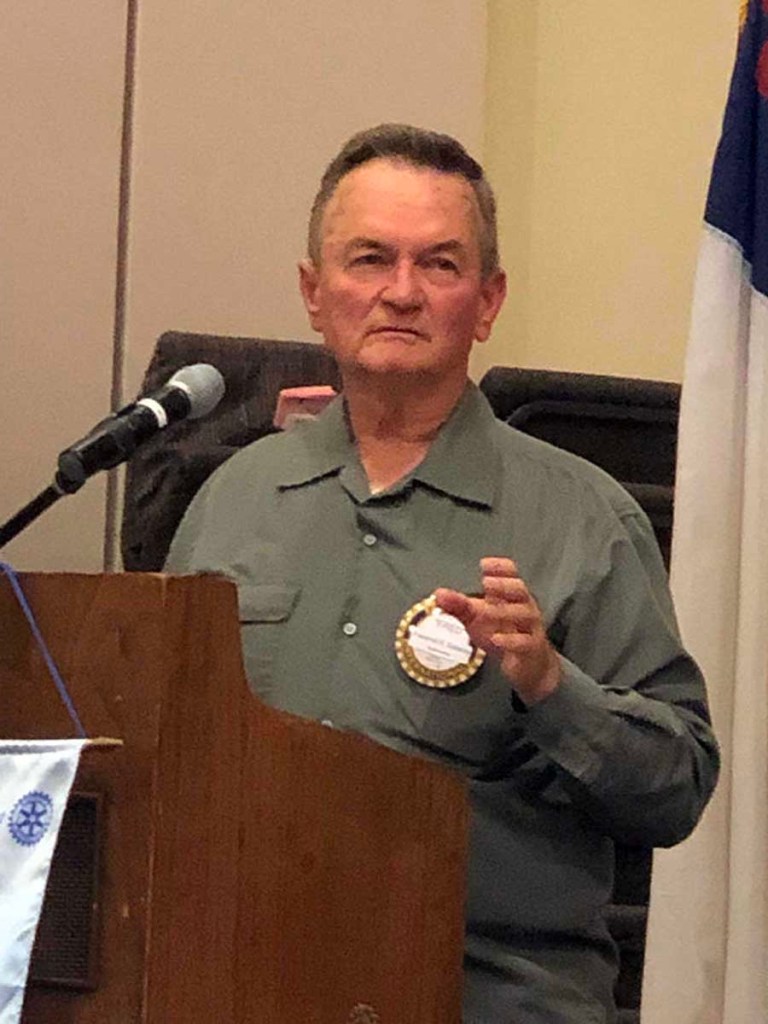‘It’s not luck, it’s prayer’: Rotarian Fred Spitalsky recounts childhood battle with polio
Published 5:30 am Saturday, November 16, 2019

- Fred Spitalsky shares his experience as the first polio meningitis survivor with his fellow Cullman Rotarians on Thursday.
Fred Spitalsky shared his experience as the first polio meningitis survivor with his fellow Cullman Rotarians on Thursday. Rotary was founded in the early 1900s with the mission of eradicating polio.
“My story had to do with prayer and faith,” said Spitalsky. His voice wavering at times, he recalled being a seven-year-old boy in Detroit, Mich., the son of devout Catholics who supported their church and the parochial school their children attended.
Trending
He woke one morning in 1954 to a fever and headache. He called to his mother, who called for a doctor. Within two hours of being examined, Spitalsky was admitted to Mount Carmel Hospital. There he was placed on an IV and blood was drawn. He recalls the nurses and doctors telling his mother that they had to break his fever because if it continued to climb “It would cause irreversible damage.” The seven-year-old boy was placed in an ice bath, and his fever broke.
While his family went home, he was kept in the hospital overnight for observation. “I was not a happy camper,” said Spitalsky. Tests proved inconclusive, and a spinal tap was ordered. “Well, I’m seven-years-old, I don’t know what a spinal tap is,” he said. He recounted the experience of being held by two large male nurses and buckled into a gurney for the procedure. The doctor warned him not to move, “and then he jabbed me and it hurt!” said Spitalsky.
Later they tested his mobility and he was able to move his arms and legs and walk around a bit. Finally the doctor came back with a diagnosis: “‘Fred has a polio virus,’ he said. But it’s not paralysis so he’s lucky.’
“My mother says, ‘It’s not luck, it’s prayer! Every student in that school prayed for him every day!’”
Spitalsky returned to school, but weeks later, while reading with one of the nuns, she noted that he was having difficulty. He told her he was “seeing two of everything.” His parents took him to an eye doctor, informing them he was experiencing double vision, headaches and had been diagnosed with the polio virus some six weeks earlier. The eye doctor sent them back to Mount Carmel Hospital.
“I’m agitated, I’m scared. I was here just a few weeks ago and they hurt me,” Spitalsky recalled.
Trending
Once again, the nurses drew blood and started an IV. And every hour, they were measuring his skull. Eventually he was given a sedative to help him calm down. When he awoke, he couldn’t see.
Scared, he called for his mother, who repeatedly assured him that the doctor was on the way. He dozed again and woke to a new voice; this time it was the doctor who introduced himself and asked the nurses, “Why is this child not ready?”
He was told to count backwards from 100 and drifted off. When he woke, he was unable to see but could feel he was restrained. He was told he’d had surgery and they didn’t want him to pull the bandages from his head.
He later learned the doctor had removed fluid on his brain that was pressing down on his optic nerve. His sight came back slowly, first shadows then shapes then colors. The bandages came off and the doctor told Spitalsky he had a choice to make.
“The doctor said the bones will grow back, but it will take months,” he said. While that happened, there was danger that bone fragments could cause more damage. The seven-year-old was given the option of having a metal plate put in to protect his skull while it healed, but that would require a second surgery to remove the plate. “The other option is to protect that side of your head,” Spitalsky remembered the doctor saying. Protecting meant no sports, no climbing, no activities seven-year-old boys typically engage in.
He weighed his options, but the idea of additional surgeries was frightening. “I told my mom, ‘I don’t want to do that. Two operations is too much.’” Spitalsky kept up with his schoolwork while going to frequent doctors’ visits where his progress was closely monitored. And he protected his head. “They didn’t have those partial helmets like they have today,” he said. “You put your hand up. You had to protect it.”
After six months, Spitalksy was at the doctor’s office again when they showed him a brochure, documenting his surgery and progress after surgery. The brochure declared him “the first survivor of polio meningitis.”
“So I thank you, Rotarians, and all your predecessors, for what you’ve done to help children like me.”
Rotary President Will Harding noted it’s the mission of Rotary to eradicate the polio virus, “so kids going forward don’t have to go through that.”





